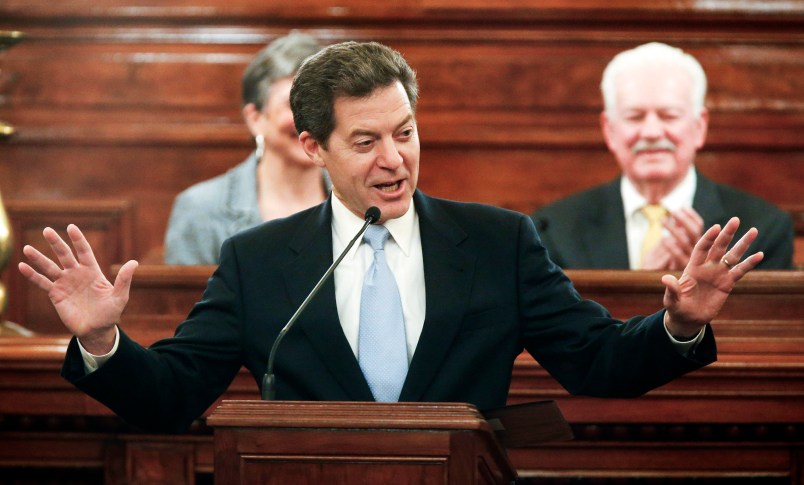Republicans are taking no chances when it comes to Obamacare’s Medicaid expansion. They’re closing every possible door. Under bills passed in Georgia and Kansas recently, even if a Democratic candidate were to pull off an upset and take the governor’s seat, they would not be able to expand the program without the consent of the state legislature — which will almost certainly remain Republican.
In other words, GOP lawmakers have taken steps to guarantee that many of their poorest residents will remain uninsured under the health care reform law, no matter what happens in the gubernatorial election.
Georgia Gov. Nathan Deal (R) and Kansas Gov. Sam Brownback (R) both oppose Medicaid expansion. They both look likely — if not quite certain — to win re-election in November. That should make the bills passed by their respective state lawmakers unnecessary, but they seem intent on guarding against even the remote possibility of a Democratic governor.
An explanation offered by a GOP lawmaker in Kansas, where the bill was signed into law by Brownback last week, points to the motive.
“Governor Brownback’s not always going to be the governor. It’s my fervent hope he’s going to be the governor for four more years after this one, but he may or may not be,” Rep. John Rubin (R) told the Wichita Eagle.
Georgia Republicans have been adamant in denying any political motivations, but the question has still been raised by the press.
“I’m totally confident that Nathan Deal is going to be re-elected governor. This is simply an opportunity for the Legislature to stake out the issue as policy,” House Speaker David Ralston told the Atlanta Journal-Constitution in February. Deal hasn’t signed the bill yet, but he still has time to do so. If he doesn’t act, it would become law automatically. Deal has said that he approved of the policy.
Georgia and Kansas have left a combined 487,000 residents uncovered under Obamacare because they refused to expand Medicaid. And, though the law remains unpopular, a recent poll found that majorities of Georgians (54 percent) and Kansans (55 percent) support Medicaid expansion.
If Democrats end up stealing the gubernatorial seats in the fall, they might have moved quickly on Medicaid expansion without the new legislation, accepting the federal funding that fully covers the expansion through 2016. Paul Davis, the state representative challenging Brownback, has voiced unequivocal support for expansion. “It’s the right thing to do,” he told the Topeka Capital-Journal last month.
Jason Carter, state senator and grandson of President Jimmy Carter, has been more coy as he vies to unseat Deal, but he has pressed for a discussion on the issue. He also has said he believes Georgia’s bill was passed with the explicit intent of stopping him from expanding Medicaid if he’s elected.
“I think it’s essentially a political bill,” Carter told Georgia Health News last month. “If you examine the bill by looking at the problem that it’s attempting to solve, it’s very difficult to discern what the Legislature believes that problem to be, other than they’re worried that I’m going to get elected governor.”
For now, Davis and Carter look like long shots. The Cook Political Report categorizes Georgia as “Solid Republican” and Kansas as “Likely Republican.” The RealClearPolitics average of polling in the two races gives Brownback and Deal a few-point advantage. However, recent polls, taken by the Democratic-leaning Public Policy Polling, actually gave Davis and Carter the upper hand, suggesting they’re not wholly out of reach.
But under these new bills, even unlikely Democratic wins won’t be enough to deliver health coverage to low-income Georgians and Kansans.






